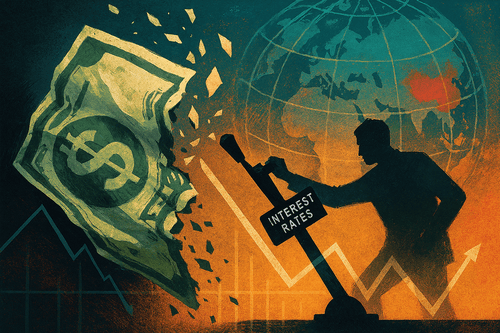
Have you ever wondered why some money feels less powerful than it once did? It’s a common feeling, one that many poeple share. Not every dollar, euro, or yen holds the same strength. Some currencies decrease in value, often because of big problems like political fights, runaway inflation, or unwise decisions by a country’s central bank.
This shrinking isn’t just a number on a chart; it hits home hard. When a currency loses value, it causes problems for everyone. We see economic worry, our hard-earned money buys less, and sometimes, it even leads to bigger troubles in a society. It’s a powerful force shaping our daily lives and futures.
This article will pull back the curtain on why currencies lose their punch. We’ll look at the main reasons behind this slide, show you real-world examples, and give you clear tips for handling money when things get shaky. Understanding these forces will help you make smarter choices with your own cash.
The Core Economic Drivers of Currency Devaluation
Inflation: The Silent Thief of Purchasing Power
Inflation means prices for everyday stuff go up steadily over time. You see it when a gallon of milk or a tank of gas costs more than it did last year. This isn’t just about things getting pricier; it’s about your money buying less than it did before.
When prices climb, the same amount of cash can’t get you as many goods or services. This means your money’s real value and its buying power both fall. It’s like having less air in your financial balloon, making it shrink.
Central banks play a big part here. If they print too much money or make it too easy to borrow, inflation often follows. This extra money chasing too few goods pushes prices higher and weakens the currency. Think about Zimbabwe in the late 2000s, where prices soared out of control. Their money became almost worthless overnight.
Interest Rates: The Balancing Act
Higher interest rates can make a country’s money stronger. Why? Because they attract investors from other countries. These investors want to put their money where it earns more. To do that, they first need to buy the local currency, which boosts its demand and value.
Central banks decide these key interest rates. Their choices strongly affect how much a currency is worth compared to others. Lower interest rates, on the other hand, can make investors look elsewhere, pulling money out of the country and weakening its currency.
Take the US dollar and the Federal Reserve, America’s central bank. When the Fed raises rates, the dollar often gets stronger. This happened recently, as higher rates made dollar-denominated assets more attractive. Conversely, when rates stay very low, the dollar might lose some of its shine.
Economic Performance and Stability
A strong economy, one that’s growing steadily, attracts foreign money. When a country’s Gross Domestic Product (GDP) is rising, it signals good investment chances. This demand for local investments also means more demand for the local currency. But if an economy slows down or hits a rough spot, investors might pull their money out. This capital flight weakens the currency.
Imagine a country that consistently buys more from other nations than it sells to them. This creates a trade deficit. To buy those foreign goods, the country needs to sell its own currency. This constant selling puts downward pressure on its money value.
Japan’s “Lost Decades” offer a historical lesson. Years of slow growth and falling prices impacted the yen’s perceived value. Even though the yen is often seen as a safe place for money, long-term economic struggles can still take a toll.
Geopolitical Factors: The Wildcards of Currency Value
Political Instability and Uncertainty
Political trouble can really shake things up for a currency. If a country faces coups, civil unrest, or major political fights, investors get nervous. They often pull their money out quickly, seeking safer places to invest. This rapid outflow of cash makes the value of local currency drop fast.
International relations also matter. Economic penalties, known as sanctions, from other countries can hurt an economy. For instance, Venezuela’s currency has suffered greatly due to various international sanctions, making life incredibly hard for its citizens. These restrictions block trade and financial interactions.
Sudden changes in government leadership or major policy shifts also create huge uncertainty. Investors dislike surprises and can react by selling off the country’s currency. A clear and stable political path helps keep a currency strong.
Global Economic Shocks and Crises
Financial problems in one big economy don’t stay put. They can spread worldwide, like a ripple effect. This “contagion” impacts currency values everywhere, as global demand for goods and services decreases. Think about how the 2008 financial crisis affected markets globally.
Countries that rely heavily on exporting raw materials, like oil or minerals, are very vulnerable to price swings. If oil prices crash, for example, the currencies of oil-exporting nations often follow. Their main source of foreign income suddenly dries up.
Big events like pandemics, such as COVID-19, can also cause huge economic problems. They lead to shutdowns, slowed down supply chains, and make governments spend a lot more money then they normally would. These issues often weaken a country’s currency.
The Consequences of a Devalued Currency
Impact on Consumers: Reduced Purchasing Power
A weaker currency really hits your wallet. When your country’s money loses value, imported goods become more expensive. This means higher prices for everything from your smartphone to your daily bread, making life cost more.
Your savings also take a hit. Money you’ve set aside in a devalued currency buys less than it used to. This can mess up retirement plans or make it harder to afford big purchases in the future. The real value of your nest egg slowly shrinks.
Consider traveling abroad. If your home currency is weak, your vacation money won’t go as far. Everything from hotel stays to meals in another country will feel much more expensive. A weak currency makes global travel a luxury.
Impact on Businesses: Export Advantages and Import Costs
A devalued currency can be a double-edged sword for businesses. On one hand, it makes a country’s exports cheaper for buyers in other nations. This can boost sales and profits for companies that sell goods internationally. It makes their products more competitive on the global stage.
However, businesses that need imported raw materials or parts face higher costs. The components they buy from abroad suddenly become more expensive to acquire. This can lower their profit margins or force them to raise prices for their own products.
A weaker currency also makes a country’s assets, such as land or companies, cheaper for foreign investors. This might attract new money into the country, which is good. But it can also spark worries about foreign groups owning too much of the local economy.
National Debt and International Obligations
For countries that owe money in foreign currencies, a devalued local currency makes debt repayment much harder. It now costs more of their own currency to buy the foreign money needed to pay back loans. This can be a huge burden on a nation’s budget.
A weaker currency also strains government finances. If a government has to pay for important imports, like medicines or fuel, or if it owes money to other nations, a devalued currency makes these expenses much larger. This can lead to budget shortfalls and even higher taxes.
Strategies for Navigating Currency Devaluation
For Individuals: Protecting Your Wealth
One smart move is to spread your investments around the world. Don’t put all your eggs in one basket, especially if that basket is your home country. By holding different currencies and assets, you can lessen the risk from any one nation’s problems.
Think about keeping some savings in strong foreign currencies. This is especially helpful if you plan to travel internationally or have bills due in other countries. It helps shield you from your own currency losing too much value.
Investing in assets that tend to do well when prices are rising can also help. Things like real estate, gold, other commodities, or bonds that adjust for inflation often protect your money’s buying power. They offer a hedge against your cash becoming worthless.
Always stay on top of the news about the economy. Knowing what’s happening lets you adjust your money plans sooner rather than later. Being flexible and ready to change your strategy is key in a shifting financial world.
For Businesses: Strategic Adaptation
Businesses can use financial tools, like currency futures or options, to lock in exchange rates. This protects them from sudden swings in currency value. It’s like buying insurance against unexpected currency drops.
Try to find suppliers in different parts of the world. Relying on just one country for key parts can be risky if its currency tanks. Spreading out your supply chain helps you avoid big cost hikes.
Keep a close eye on currency exchange rates and adjust your prices as needed. If your currency weakens, you might make your exports cheaper to grab more sales. If imports cost more, you might need to raise your prices at home.
Lastly, a weaker currency can make your products more appealing to foreign buyers. Look for new markets to sell your goods. This can turn a challenge into a chance for growth and bigger profits.
Conclusion
We’ve explored the main forces that can make a country’s money lose its value. These include things like fast-rising prices, how central banks set interest rates, a country’s economic health, and big global events. We saw how political trouble and worldwide shocks also play a huge role.
It’s clear that everything is connected in the world of money. A currency’s strength comes from a complex mix of local and international factors. No single thing acts alone. Understanding this web of connections is key.
Knowing why currencies change value helps everyone. It empowers you, whether you’re an individual saving for the future or a business planning for growth. This knowledge lets you make smarter money moves and build a stronger financial life, no matter what the global economy throws your way.
